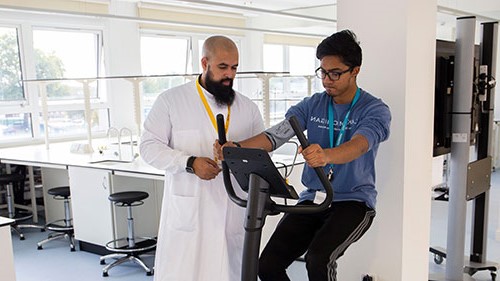Search
Health and Social Care BA (Hons)
Study level: UndergraduateHNC/HND courses

This Health and Social Care BA (Hons) course explores the core concepts of healthcare through theoretical and practical learning.
Course features
Course option
Year of entry
Location
CU London (Dagenham, London)
Study mode
Full-time
Sandwich
Duration
4 years sandwich
3 year - Degree
2 year - HND
1 year - HNC
UCAS codes
L512 / L511 / L513
Start date
January 2026
March 2026
May 2026
June 2026
Course overview
This course aims to help you become a knowledgeable, enthusiastic and skilled individual ready to support the delivery of health and social care within the NHS, local authority services, private health provision or third-sector services. It provides the opportunity for the development of the knowledge and skills required of healthcare support workers, community healthcare workers and those with roles in health and social care, and can offer a Continuing Professional Development opportunity for those in the sector.
This course is designed to:
- analyse the interaction between sociology, social policy and health
- prepare you to work in this dynamic and demanding sector by exploring health on an individual and societal level
- explore how society is organised and how we care for the vulnerable, the challenges facing modern society and the importance of caring for our environment.
Why you should study this course
The curriculum is diverse and contemporary and is designed to cover:
- collaborative approaches to teaching and learning that introduce students to a broad range of local services
- visits, activities and collaborations that expose students to a variety of local providers
- opportunities for learning outside the classroom and an approach to teaching that includes applying your learning2.
- potential opportunities in a range of health and social care careers with local employment options.
Choose to study at CU London and you will can also benefit from:
- A diverse team of experienced tutors with a range of backgrounds in areas such as health care, social care, community work and leadership.
- opportunity for international trips2
- opportunity for sandwich year2.
What you'll study
We regularly review our course content to make it relevant and current for the benefit of our students. For these reasons, course modules may be updated.
How you'll learn
This course is available as a full-time three-year or optional four-year sandwich course, with the latter incorporating a work placement or study year in a related field2.
We take an active and varied approach to teaching and learning. Teaching sessions will be active and applied and utilise a variety of teaching styles. You may also have the opportunity to collaborate with local service providers to understand the local health and social care sector. We also operate an open-door policy, with additional availability via email and our current online learning platform, Aula.
Progression through the modules develops knowledge and skills, including communication (written and oral), study skills, research methods, project management, presentation and career development. We will also encourage you to consider your employability and/or entrepreneurial development.
Unlike traditional institutions, there are no end-of-year exams. Instead, learning is assessed through coursework and phase tests, which is more reflective of our learning model.
Teaching contact hours
As a full-time undergraduate student, you will study modules totalling 120 credits each academic year. A typical 20 credit module requires a total of 200 hours study. This is made up of teaching contact hours, guided and independent study.
Teaching hours:
Teaching hours vary depending on year of study and due to module selection. During your first year you can expect 15-18 teaching hours each week. You will also have the option to attend optional sessions including time with a progress coach or to meet with staff for advice and feedback. As you progress through your studies, teaching hours may reduce.
Guided and independent study:
Throughout your studies, you will be expected to spend time in guided and independent study to make up the required study hours per module. You’ll be digging deeper into topics, review what you’ve learned and complete assignments. This can be completed around your personal commitments. As you progress through your studies, you’ll spend more time in independent study.
Online learning:
As an innovative university, we use different teaching methods including online tools and emerging technologies. So, some of your teaching hours and assessments may be delivered online.
Assessment
The learning outcomes of modules, assignments and projects will be clearly stated. Your work will be marked according to how well you achieve these learning outcomes and your final feedback will refer to each outcome, as well as providing an overall percentage grade.
Assessment methods vary and include, practical class and project performance, written practical reports, project thesis, tutorial tasks and assessments.
The Coventry University Group assessment strategy ensures that our courses are fairly assessed and allows us to monitor student progression towards achieving the intended learning outcomes.
Entry requirements
Typical entry requirements:
Fees and funding
| Student | Full-time | Part-time |
|---|---|---|
| UK, Ireland*, Channel Islands or Isle of Man | £9,535 per year | Not available |
| EU | £9,535 per year with EU Support Bursary** £14,800 per year without EU Support Bursary** |
Not available |
| International | £14,800 per year | Not available |
If you choose to study this course with a professional placement2 or study abroad year, you will need to pay a tuition fee3 to cover your academic support throughout your placement year. Students commencing their professional placement in the academic year 2027/28 will pay £1,500 if they are paying UK fees, or £1,800 if they are paying international fees.
For advice and guidance on tuition fees and student loans visit our undergraduate finance page and see the university’s Tuition Fee and Refund Terms and Conditions.
The University will charge the tuition fees that are stated in the above table for the first Academic Year of study. The University will review tuition fees each year. For UK (home) students, if Parliament permits an increase in tuition fees, the university may increase fees for each subsequent year of study in line with any such changes. Note that any increase is expected to be in line with inflation.
If you choose to study this course with a professional placement, the University will charge the tuition fees stated above for those on a placement during Academic Year 2027/28. The University will review professional placement tuition fees each year. For UK (home) students, the University may increase fees for each subsequent year of study, but such that it will be no more than 5% above inflation.
For international students, we may increase fees each year, but such increases will be no more than 5% above inflation. If you defer your course start date or have to extend your studies beyond the normal duration of the course (e.g. to repeat a year or resit examinations) the University reserves the right to charge you fees at a higher rate and/or in accordance with any legislative changes during the additional period of study.
We offer a range of international scholarships to students all over the world. For more information, visit our international scholarships page.
Tuition fees cover the cost of your teaching, assessments, facilities and support services. There may be additional costs not covered by this fee such as accommodation and living costs, recommended reading books, stationery, printing and re-assessments should you need them.
The following are additional costs not included in the tuition fees:
- Any optional overseas field trips or visits: £400+ per trip.
- Any costs associated with securing, attending or completing a placement (whether in the UK or abroad).
*Irish student fees
The rights of Irish residents to study in the UK are preserved under the Common Travel Area arrangement. If you are an Irish student and meet the residency criteria, you can study in England, pay the same level of tuition fees as English students and utilise the Tuition Fee Loan.
**EU Support Bursary
Following the UK's exit from the European Union, we are offering financial support to all eligible EU students who wish to study an undergraduate or a postgraduate degree with us full-time. This bursary will be used to offset the cost of your tuition fees to bring them in line with that of UK students. Students studying a degree with a foundation year with us are not eligible for the bursary.
Facilities
CU London Dagenham campus is in the Civic Centre building and is easily accessible by road, bus and rail. Facilities include:
- classrooms with interactive teaching capabilities
- comprehensive library and learning services
- study areas, laptops/open-access computers and social spaces
- student support and careers advice teams
- onsite free student parking.
Facilities are subject to availability. Access to some facilities (including some teaching and learning spaces) may vary from those advertised and/or may have reduced availability or restrictions where the university is following public authority guidance, decisions or orders.
Careers and opportunities
On successful completion of the course, you will have the knowledge and skills to be able to succeed in the health and social care sector. You will develop communication skills and the ability to work as part of a team. Through teaching and assessment, you will have developed a range of digital skills that are required for work and be able to demonstrate a range of competencies.
On successful completion you could explore roles in a variety of health and social care settings, such as working with those experiencing mental health issues or domestic violence, tackling environmental health issues or in public health teams. You may wish to continue to further your studies at postgraduate level in areas such as nursing, social work or postgraduate teacher training.









